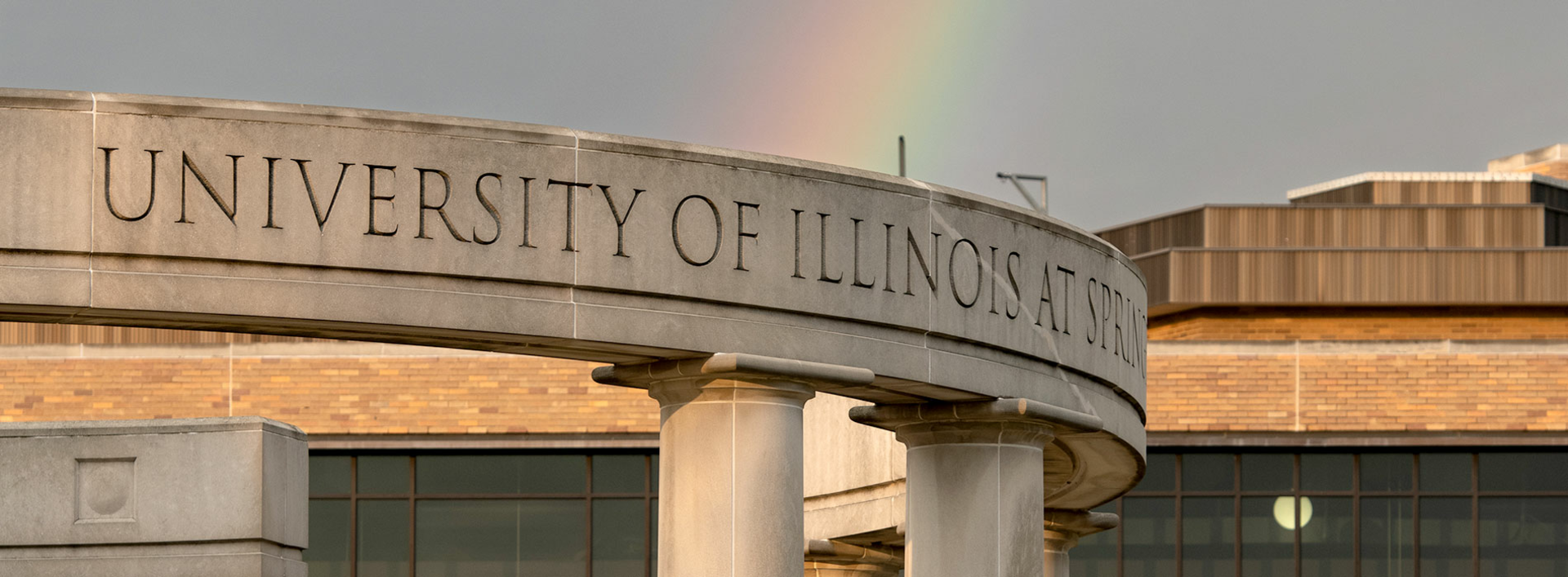UIS NorthStar Initiative
NorthStar is our guide to operationalizing the UIS Strategic Compass through the reshaping of our university for operational efficiency and academic excellence to ensure long-term sustainability and relevance.
UIS seeks to be a resilient, adaptable and market-aligned academic institution. To achieve this, we must maintain our student-centered approach and focus on action items that will position UIS to be fiscally sustainable, market-relevant and growth-minded.
UIS' Three NorthStar Priorities for Academic Year 2024-25

Priority 1: Academic Portfolio Review & Prioritization: Conduct an academic portfolio review to ensure all programs are on a sustainable path to meet IBHE enrollment and completion standards.
The Academic Portfolio Review Task Force was announced in September 2024 with a charge to conduct a holistic academic program portfolio review by developing metrics, criteria and process recommendations for a market-relevant and mission-aligned program portfolio evaluation. The task force has been meeting regularly since November 2024. Agenda and updates can be found on the Academic Portfolio Review Task Force website. The goal for this priority is to complete the review by the end of Spring 2025.
On Feb. 7, the provost shared out the task force's recommendations. Members of the UIS community were invited to submit comments about the report. Provost Schwab has reviewed and considered comments to inform next steps of the program prioritization process.
A list of questions and answers about the implementation of the academic portfolio review is available on the task force website.
The tentative timeline for the portfolio review is:
- Program list verification to UEOs - sent March 6, due March 17
- Program questionnaires to UEOs - After spring recess, due late April
- UEOs receive data for validation - Mid-May to early June
- Finalize program review data - Mid-June
- Dashboard/reports finalized - End of June
- Prioritization review - Late June/July
- Reports to UEOs/admins - July
- Responses from programs - Fall 2025

Priority 2: Deficit Reduction: Achieve an annual budget balance of zero by 2029.
Over the past several years, the university's budget has accumulated a deficit that must be reduced. There are two primary ways to improve our fiscal outlook: grow revenue through increased enrollment and reduce and/or better control expenses. With enrollment growth a continued challenge nationally for public regional universities, UIS cannot rely solely on enrollment and retention improvements to effectively balance the budget.
Tactics to help achieve this strategy include:
- Hiring Freeze: In place as of September 2024, all requested positions and salary increases must first be reviewed by the Strategic Staffing Committee, comprised of the chancellor and vice chancellors, before being approved to post. Hiring managers are encouraged to think creatively and carefully about how to approach vacancies before requesting a position be filled.
- Mid-cycle budget cuts: Proposals for 2-, 3- and 4-percent cuts were presented in November to the University Budget and Planning Committee. The Chancellor's Cabinet received the committee's recommendations in December and voted in early January. The outcome of this budget-cut exercise was announced to division leaders the week of Jan. 13.
- Voluntary Separation Plan: This initiative was announced in January and is final stages. A message detailing the VSP was sent to all employees on Jan. 22. The university will share final numbers in May.
- Second-half Fall 2024 enrollment push: This effort proved successful with a 4.56 increase in credit hours as compared to Fall 2023. UIS continues to focus on growing enrollment each term. Spring 2025 enrollment was up slightly, according to numbers available on the 10th day of classes.
- Space Utilization Study: This effort is under way, and a few opportunities are under consideration. More will be shared following this exploration period. The goal of this initiative is to optimize the use of space on campus to allow for cost-savings and operational synergies.
- Other initiatives: Developing a strategy for use and distribution of the remaining Strategic Investment Fund dollars (approximately $1.1 million); exploring funding model changes in areas that generate non-state dollars; a space utilization study (to begin in February 2025); and continued reviews of our scholarship distribution.

Priority 3: Student Retention: Improve student persistence, reduce dropout rates and increase graduate rates.
UIS wants students who attend our university to complete their degree or achieve their non-degree academic goals. A number of initiatives are under way to better understand why some UIS students may "stop out" and use that data to build programs and initiatives to better retain them.
Tactics in place to work toward this priority include:
- A Retention Plan Steering Committee has been established and is led by individuals representing the divisions of Academic Affairs, Student Affairs and Enrollment and Retention Management. The purpose of this group is to develop a comprehensive, institution-wide retention initiative that supports the UIS mission, enhances student success and improves retention rates across all demographics, academic programs and modalities.
- The Associate Vice Chancellor for Undergraduate Education position has been renamed as Associate Provost for Student Success and Undergraduate Education with a new focus on student success and support. Michael Roth began in the APSSUE position in mid-March.
- Athletics has redesigned its student support roles to enhance the facilitation of student-athlete success.
- Student Affairs has reimagined New Student Orientation to provide a stronger initial start for incoming students.
- UIS staff has ramped up outreach to students who have stopped out but are close to earning a degree. Additionally, we are working with outside partners to identify ways to better re-engage with stop-out students.
- GPA information has been added in AdviseU for reference by advisors when talking about student’s best course of study.
- Advisors have participated in training workshops (both initial and ongoing).
- Students who have not yet registered are contacted by advisors to offer support.
- Internal dashboards have been created for use in analyzing retention-related data.
- Retention efforts have been aligned across campus to support HLC Quality Initiative work.
Forum Recordings
Aug. 22, 2024: UIS Faculty-Staff Academic Year Kickoff
Oct. 16, 2024: Fall Employee Info Session
Feedback and Questions
Have questions, concerns or ideas? Share them via the NorthStar Strategic Priorities Feedback Form. Submitted questions may be used to develop an FAQ in the future.
Have a success story to share related to one of our three NorthStar priorities? Send it to chancellor@uis.edu.
Latest News
Voluntary Separation Plan
A Voluntary Separation Plan (UIS-VSP) is available for all employees who have an appointment greater than 50% FTE and who have not provided a written notice of resignation or intent to retire from UIS prior to the Plan Effective Date. The UIS-VSP is designed to help UIS manage budgetary goals because of declining enrollments and increased personnel costs, while providing Eligible Employees with the choice of a separation incentive opportunity. Full plan documentation and application can be found here: (Resources and Information | University of Illinois Springfield).
The application window opens at noon Jan. 27 and closes at 11:59 p.m. Feb. 28. Eligible Employees will be notified of the university’s decision to accept or decline their request to participate in the UIS-VSP by March 14. Questions may be directed to UIS-VSP@uis.edu.
Hiring Freeze
Announced in the Chancellor’s newsletter on Sept. 16, 2024, any new position requests that come forward must have approval by unit and/or division leadership and will be evaluated by the Strategic Staffing Committee. This includes requests to backfill new vacancies. Hiring managers are encouraged to think creatively about how to meet operational needs when vacancies occur before requesting a replacement hire. Essential positions will be allowed to be filled.
Program Portfolio Review
As shared in the Provost’s September newsletter, we initiated a review of our academic portfolio this fall to assess the long-term sustainability of our program offerings. This will include an external market analysis of our programs to better assess how our programs meet the needs of students and the regions we serve. We have assembled a working group composed of faculty and others recommended by the Campus Senate, academic colleges and administration to help move this important work forward and to identify the best mechanisms to keep the university community informed.
